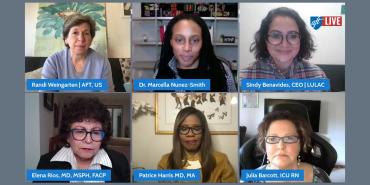In celebration of Women’s History Month, the AFT town hall on March 23 featured a conversation about the impact the COVID-19 pandemic has had on women, as well as the best ways to make vaccine distribution more equitable amid emerging disparities.
The panel, which was led by AFT President Randi Weingarten, included Dr. Marcella Nunez-Smith, chair of the U.S. COVID-19 Health Equity Task Force and senior adviser to the White House COVID-19 response team; Julia Barcott, a registered nurse and member of the Washington State Nurses Association; Sindy Benavides, CEO of the League of United Latin American Citizens; Dr. Patrice Harris, immediate past president of the American Medical Association; and Dr. Elena Rios, president of the National Hispanic Medical Association.
The pandemic has disproportionally impacted women in many ways, including higher job losses; greater exposure to COVID-19 because women often work on the frontlines of healthcare and other essential services; and a heavier toll on their mental health.
Weingarten said that Joe Biden’s presidency has been the antidote needed to address the inequities assailing women, especially those in Black and brown communities. Biden’s American Rescue Plan will help struggling Americans and go a long way in disrupting poverty and inequity, said Weingarten.
The disparities we have seen during the pandemic, particularly in healthcare, have been around for a long time. “We know that the inequities didn’t arrive yesterday,” said Nunez-Smith. “We know that it’s often the marginalized, minority communities that are the first to be forgotten when resources are scarce, and we want to disrupt that narrative and make sure people get connected with vaccines.
“It wasn’t long after the virus was identified in the U.S. that we saw the disparities in testing, cases, hospitalization and deaths. Now we see disparities in access to therapeutics and vaccines,” said Nunez-Smith.
To disrupt the narrative, it’s essential to start by “acknowledging that equity never happens by default, only with intentionality,” she said. “We have to be intentional so that there are pathways to opportunity for everyone on the other side.”
Barcott, a registered nurse who works in her hospital's intensive care unit in Toppenish, Wash., said that nurses can play a larger role in getting people vaccinated. “We expect people to know what nurses do,” she said, noting that the pandemic has shown the public that nursing is not like it is on television. “We are the leaders and advocates for our patients’ care, and a lot of issues we have brought up are validated by this pandemic. For a long time, we’ve been very concerned about healthcare inequities and cuts to public health. Since we are the most trusted profession,” Barcott said, “we need to step up and take a front role in getting vaccines out to people.”
LULAC’s Benavides said thousands of jobs held by women have vanished since the pandemic. “What we are seeing in this pandemic is a complete rollback of all the work that has happened to make sure that women are finally in our workforce,” she said.
Looking to the future, Benavides wants to focus on closing the pay equity gap, achieving paid sick leave and work flexibility for women. “I’m privileged to be able to work from home,” said Benavides, who acknowledges that many Latinos don’t have access to technology and broadband; some are not computer literate and can’t access forms online to sign up for the vaccine.
Benavides shared another concern, noting that “in this moment in time, our community is being hit with misinformation about this vaccine.”
Dr. Harris said, “Misinformation has interfered with the ability to make sure people have the accurate information they need.” She pointed out that it’s OK for people to have appropriate curiosity or questions about the vaccine, but there’s a difference between that and refusing to get vaccinated. “We need to make sure we have trusted messengers out there. It’s important to tell people what we know and what we don’t know about getting vaccinated, to make sure that we are combating misinformation.
“This pandemic has exposed a lot of fault lines, especially when it comes to public health, the lack of mental health infrastructure, health inequities and unpaid caregiving,” said Harris. “We are going to have to prepare for the mental health needs related to COVID.”
Harris encouraged women to remember to focus on their self-care. “This is a very difficult time—as women, we tend to care for others and put ourselves last. It’s important to give ourselves the grace and space to feel what we are feeling. And when you need help, ask for it.”
Dr. Elena Rios, president of the National Hispanic Medical Association, said her group is focused on its #Vaccinate4All campaign. “We thought in the Latino community that it’s important that all of the family needs to be vaccinated, especially women. The women typically care for everyone else, and we have to remind them that they have to be part of the solution.”
Rios also wants schools and churches to be vaccination hubs for families and members of the community. Nunez-Smith agreed, saying that partnerships with schools and churches would improve vaccine access, because they are venues that are convenient and trusted by the community.
“We can’t underestimate the power of and necessity for partnership,” said Nunez-Smith. “Getting the venue right is step one. The next piece is connecting people with the vaccine.”
[Adrienne Coles]

